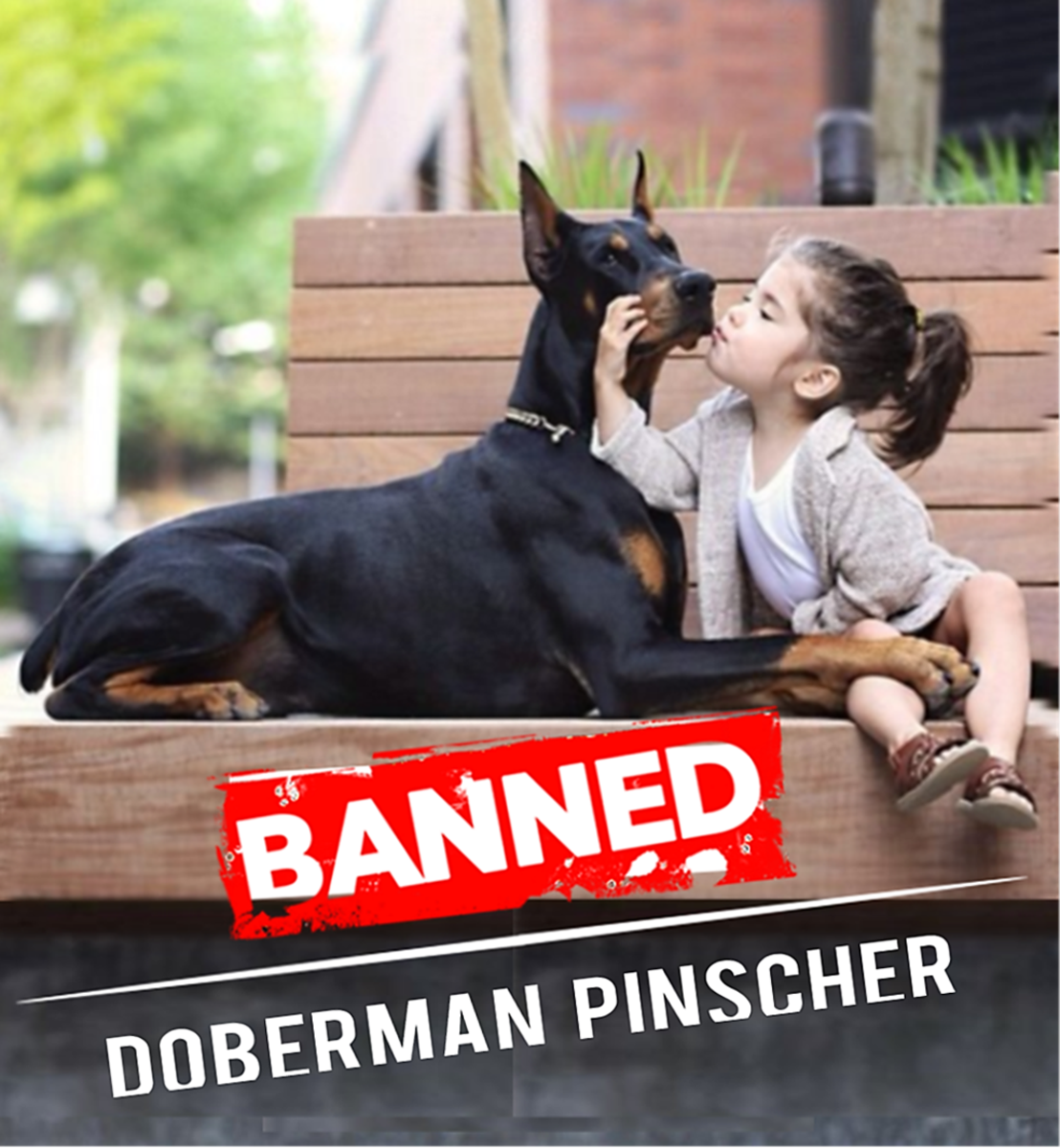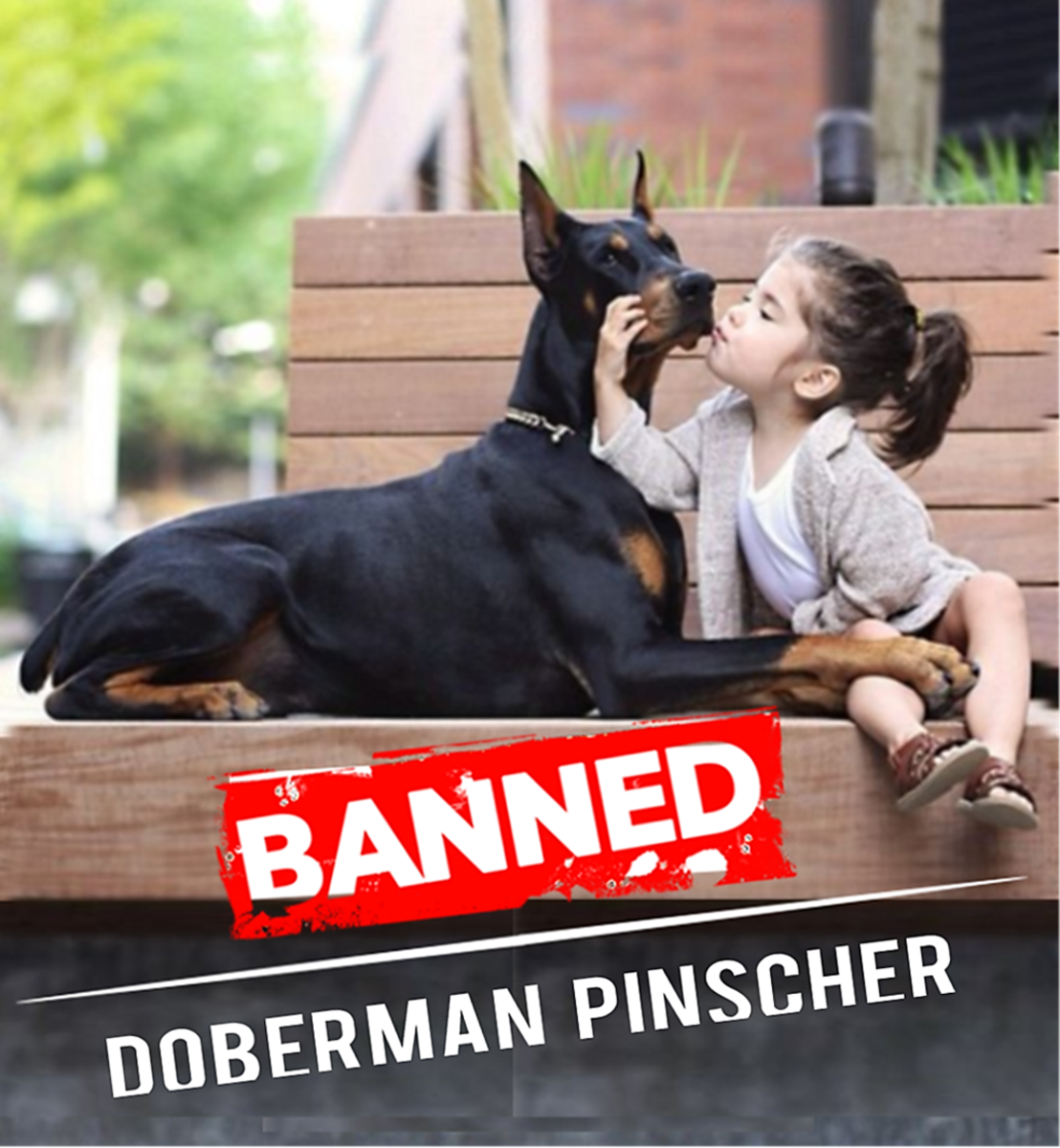The ban on Doberman Pinschers is a topic of much debate and controversy. While it may surprise many, these elegant and powerful dogs have often found themselves facing restrictions or outright bans in certain regions. But what could possibly lead to such measures against a specific breed of dog?
Dobbermans have garnered a reputation in popular culture as aggressive and dangerous animals. However, it is important to note that breed-specific bans are not solely based on the dog’s inherent nature, but rather on incidents or statistics that associate them with higher risks. Understanding the reasons behind the banning of Doberman Pinschers requires delving into both their history and the factors that contribute to public safety concerns.
Doberman Pinschers are often banned due to misconceptions about their temperament. While they can be protective and assertive, proper training and socialization can mitigate any potential aggression. It’s important to note that breed bans vary by location, and are typically based on public safety concerns. Responsible ownership and education are key to understanding the true nature of Doberman Pinschers and ensuring their positive integration into society.

Why are Doberman Pinschers Banned?
Doberman Pinschers are often considered to be intimidating and aggressive dogs. This has led to them being banned or restricted in certain regions and countries. Let’s explore the reasons behind the ban on Doberman Pinschers and understand the factors that contribute to their restricted status.
Perceived Aggression and Dangerous Behavior
One of the primary reasons why Doberman Pinschers are banned or restricted is due to the perception of their aggression and dangerous behavior. While it is important to note that not all Dobermans exhibit aggressive tendencies, certain individuals may display behavioral issues if not properly trained and socialized.
Instances of Doberman Pinschers being involved in attacks or incidents of aggression have contributed to their negative reputation. These incidents often receive significant media coverage, further perpetuating the idea that Dobermans are inherently dangerous. Public safety concerns have led to the implementation of bans and restrictions on this breed in many areas.
It is essential to recognize that responsible ownership and proper training play a crucial role in the behavior of any dog, including Doberman Pinschers. With appropriate socialization, training, and responsible ownership, Dobermans can be loving and well-behaved companions.
Perception of Doberman Pinschers as Guard Dogs
Another reason for the ban or restriction on Doberman Pinschers is the perception of them as guard dogs. Due to their appearance, intelligence, and loyalty, Dobermans have historically been chosen for roles as guard and protection dogs.
While this is a positive trait for those seeking protection or security, it has also contributed to their image as potentially dangerous dogs. The fear of Dobermans being used for illegal purposes or becoming aggressive in protective scenarios has led to their restricted status in certain areas.
Breed-specific Legislation
Many regions and countries have implemented breed-specific legislation (BSL) as a means to control and regulate dog breeds deemed dangerous or aggressive. Doberman Pinschers are often included in these bans or restrictions under BSL.
BSL aims to prevent incidents involving dangerous dogs by imposing restrictions on specific breeds or types of dogs. While the intention behind BSL is to promote public safety, critics argue that it is an ineffective approach since it focuses on breed rather than individual behavior and training.
Breed-specific legislation has garnered significant controversy, with opponents arguing that it unfairly targets specific breeds based on stereotypes and perpetuates misinformation about the inherent aggressiveness of certain dogs.
Negative Public Perception
The negative image and public perception surrounding Doberman Pinschers have contributed to their bans or restrictions in various areas. Media portrayal and popular culture often depict Dobermans as aggressive attack dogs or villains in movies and television shows.
These stereotypes can influence public opinion and reinforce the belief that Dobermans are dangerous dogs. Consequently, legislation targeting Dobermans can arise as a response to public concerns and fears, regardless of individual dog behavior or responsible ownership.
Alternatives to Banning Doberman Pinschers
Instead of implementing blanket bans or restrictions on Doberman Pinschers, alternative approaches can focus on education, responsible ownership, and enforcement of existing laws regarding dog behavior and safety.
By promoting responsible dog ownership, including proper training and socialization, potential behavioral issues and incidents can be minimized. Encouraging owners to enroll their Dobermans in obedience classes and providing resources for education can help address public concerns.
Additionally, enforcing laws related to responsible pet ownership, such as leash laws and regulations on aggressive dog behavior, can target specific issues and ensure that all dog owners are held accountable for the behavior of their pets, regardless of breed.
Ultimately, it is essential to examine the factors that contribute to the banning or restriction of Doberman Pinschers and consider alternative approaches that prioritize responsible ownership and education over breed-specific legislation.
Conclusion
The banning or restriction of Doberman Pinschers is driven by concerns related to perceived aggression, negative public perception, breed-specific legislation, and the association of Dobermans with guard dogs. However, responsible ownership, training, and education can play a crucial role in addressing these concerns without unfairly targeting an entire breed.
Key Takeaways
Doberman Pinschers are sometimes banned due to misconceptions about their temperament and behavior.
Some cities and municipalities have banned Doberman Pinschers based on their reputation as aggressive dogs.
However, breed-specific legislation banning certain dog breeds has been criticized for its ineffectiveness and unfairness.
It is important to note that not all cities or countries ban Doberman Pinschers, and many people have had positive experiences with this breed.
Proper socialization, training, and responsible ownership can help prevent any potential issues with Doberman Pinschers and other dogs.
Frequently Asked Questions
In this section, we will address some common questions related to why Doberman Pinschers are banned in certain places. Read on to learn more about this topic.
1. What are the reasons for banning Doberman Pinschers in some locations?
Doberman Pinschers are banned in certain places due to various reasons. One of the main reasons is the stereotype and misconception that Dobermans are aggressive and dangerous dogs. This perception stems from their strong build, alert nature, and protective instincts, which can sometimes be misinterpreted as aggression. Additionally, there have been instances where poorly trained or mistreated Doberman Pinschers have displayed aggressive behavior, contributing to the negative image of the breed.
Another reason for the ban is the potential liability associated with owning a dog breed that is often portrayed negatively in the media. Insurance companies may also have restrictions or higher premiums for homeowners with certain dog breeds, including Doberman Pinschers. Finally, some places have breed-specific legislation (BSL) in place, which prohibits or restricts ownership of certain breeds, including Doberman Pinschers, based on their perceived risk or potential for aggression.
2. Are all Doberman Pinschers aggressive?
No, not all Doberman Pinschers are aggressive. Like any dog breed, their temperament and behavior are influenced by various factors, including genetics, upbringing, and training. While Dobermans have a protective nature and can be wary of strangers, proper socialization, training, and responsible ownership can help promote a well-behaved and friendly Doberman.
It is essential to remember that each dog is an individual, and generalizations about an entire breed can be misleading. It is unfair to assume that all Doberman Pinschers are aggressive simply based on their breed. Responsible breeders prioritize temperament and work towards producing Dobermans with stable and friendly personalities.
3. Can Doberman Pinschers be trained to be non-aggressive?
Yes, Doberman Pinschers can be trained to be non-aggressive. Early socialization and obedience training are crucial for any dog, including Dobermans. Exposing them to different people, animals, and environments at a young age helps them develop confidence and learn appropriate behaviors.
Positive reinforcement training methods, which involve rewarding desired behaviors, can be particularly effective with Doberman Pinschers. Consistency, patience, and clear communication between the owner and the dog are key to training a Doberman to be non-aggressive. Consulting with a professional dog trainer or joining obedience classes can also be beneficial.
4. Are there any locations where Doberman Pinschers are not banned?
Yes, Doberman Pinschers are not banned in all locations. The regulations regarding the ownership of Dobermans vary from place to place. In many areas, Dobermans are allowed as long as they are properly licensed, vaccinated, and follow responsible ownership guidelines.
It is important to research and understand the specific regulations and restrictions in your area before considering owning a Doberman Pinscher. Local animal control agencies or breed-specific clubs can provide information about the rules and requirements for owning a Doberman in your locality.
5. What can I do to help change the perception of Doberman Pinschers?
If you would like to help change the perception of Doberman Pinschers, there are several things you can do. First, educate yourself about the breed and dispel any misconceptions or stereotypes you come across. Share accurate information about their temperament, behavior, and positive qualities.
Second, if you own a Doberman Pinscher, be a responsible owner and ensure your dog is properly trained, socialized, and well-behaved. Your dog’s behavior and demeanor can challenge the negative stereotypes associated with the breed.

Dobermans Are Banned in So Many Places—Cities, Towns, Whole Countries!
Doberman Pinschers are banned in certain places due to their reputation as aggressive dogs.
They have a history of being trained for protection and security, which has led to misconceptions about their temperament. While not all Dobermans are aggressive, some individuals may exhibit territorial behavior or aggression towards strangers if not properly trained and socialized.
